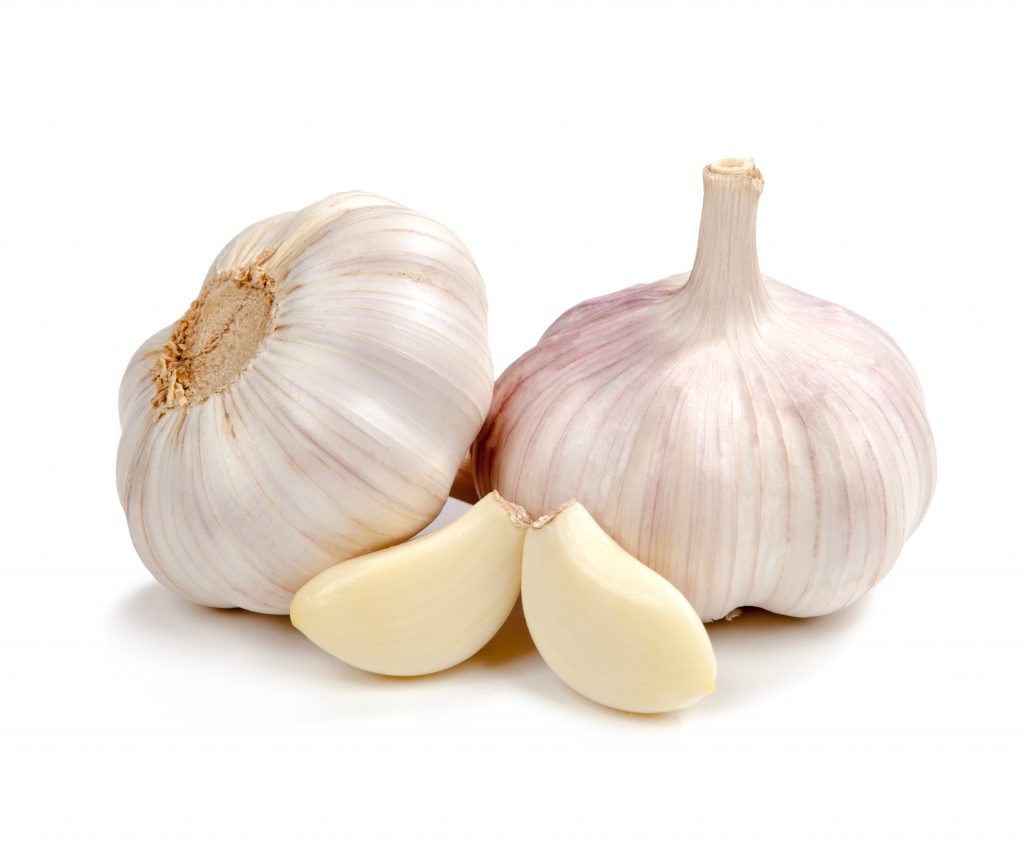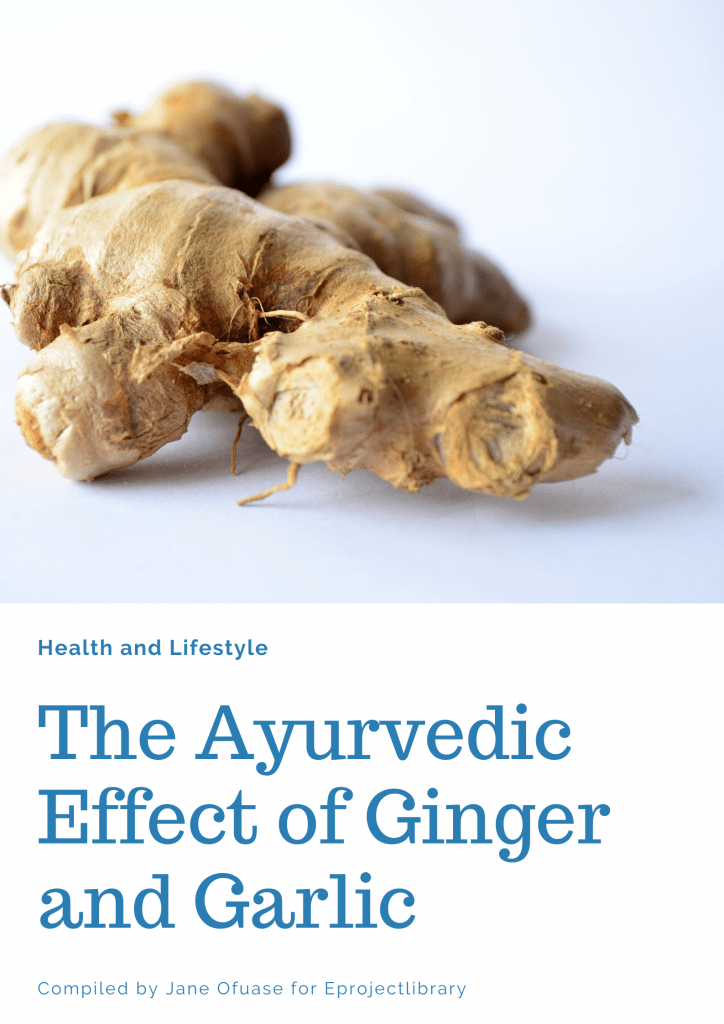This article covers the health benefits of ginger and garlic consumption.
Ginger (Zingiber officinale)
Ginger (Zingiber officinale) is a flowering plant whose root is widely used for its health benefits and spice.
People have used ginger in cooking and medicine since ancient times. It is a popular home remedy for nausea, stomach pain, and also, other health issues.
It is believed to be one of the first spices that were exported from Asia, being native to island Southeast Asia, also, was used by ancient Greeks and Romans (Sutarno et al., 2020).

There are many forms of ginger; for instance, fresh, dried, pickled, preserved, crystallized, candied, powdered/ground as supplements for its health benefits (Bode & Dong, 2011).
Antioxidants and other nutrients in ginger may help prevent or treat arthritis, inflammation, and various types of infection.
Researchers have also studied its potential to reduce the risk of diabetes, cancer, and other health problems.
Garlic (Allium sativa)
Garlic (Allium sativa) a specie of onion genus, Allium.
The use of garlic as a seasoning spice and in traditional medicine has been since time immemorial.

80% of the world’s garlic supply comes from China, that is to say, China is the largest produces of garlic (Wikipedia, 2020).
Meanwhile, Garlic consumption has prevented several conditions linked to the blood system and heart, including atherosclerosis (hardening of the arteries), high cholesterol, heart attack, coronary heart disease, and hypertension.
This article will look at the potential health benefits of ginger and garlic, as well as, cover any research that supports the claims.
12 HEALTH BENEFITS OF GINGER AND GARLIC
Relieves Nausea
A bioactive component in fresh and dried ginger, known as gingerol, which also gives the root its taste alongside other compounds contained in ginger, increases the digestive responsiveness and helps dense the stomach, which reduces nausea effect (Panoff, 2019)
The ability of ginger to act within the gastrointestinal tract, increasing gastric tone, and, thereby increasing gastric emptying.
Explaining the wide use in treating and relieving symptoms of functional gastrointestinal disorders, which include, abdominal pain, dyspepsia, and nausea (Iñaki & José , 2016)
Relieves Cold/Flu
Ginger contains sesquiterpenes, antiseptic and anti-inflammatory chemicals that act on rhinovirus (serotypes causing respiratory infections), making it an ideal remedy for cold (Sperlazza , n.d.)
Also, the anti-inflammatory properties contained in ginger are similar to those of Nonsteroidal anti-inflammatory drugs (NSAIDs), which qualifies it as an excellent remedy for flu, headaches and menstrual pains (NDTV, 2018)
Further, the gingerol present in ginger help makes the body stronger by building the immune system, thereby providing instant relief.
Likewise, Garlic served as a supplement can boost the immune system.
A study has shown that high doses of garlic extract (about 2.56 grams a day) reduced the number of days by which a person was sick with cold/flu by 61% (Leech, 2018)
Pain Relieve
Research has shown that regular intake of ginger can help in relieving certain pains that come with rheumatoid arthritis and osteoarthritis.
Most importantly, prevents some side effects that emerge from the use of conventional pain killers (McQuillan , n.d.).
Also, a study conducted in 2010 showed that intake of ginger, whether in its raw or heated form, would lead to a reduction in muscular pain (Aaron & Wilson , 2017).
Further, scientists have said that garlic relieves pain associated with osteoarthritis and rheumatoid arthritis through flavonoid quercetin, a chemical it contains (Baron-Faust , 2013).
Reduces Inflammations
Ginger’s anti-inflammatory properties -gingerol, shogaol and parasol, allows it to fetter pro-inflammatory cytokines (immunoregulatory proteins), which are responsible for frequent inflammation in the body, thereby reducing the levels of inflammation occurrences in the body (Venosta, 2019).
Garlic, on the other hand, contains an anti-inflammatory property known as diallyl disulfide which also helps fight inflammation by limiting the effects of pro-inflammatory cytokines (Arthritis Foundation, n.d.).
Improves Cardiovascular Health
Research shows that ginger can play a role in maintaining a healthy heart by reducing the risk of heart attack and stroke.
The anti-inflammatory properties contained in ginger qualifies it as a cholesterol-lowering and anti-inflammatory blood thinner, which is very important to those ailing from heart disease.
The gingerol, helps prevent abnormal blood coagulation (Ginger people, 2017).
Also, in a research study, it was found that people with higher usage of ginger had a lower chance of having chronic heart disease or hypertension (Myers & Thompson, 2019).
Likewise, studies have shown that an intake of 4 cloves of garlic per day will go a long way in reducing high blood pleasure/hypertension, which is a major driver of Cardiovascular diseases (Leech, 2018)
Combats Diabetes
Scientists have linked some compounds in ginger with improvement in insulin regulation and metabolism (London, 2018).
Over the years, ginger has been shown to help reduce blood sugar levels and help regulate insulin response in people with diabetes
Garlic also helps diabetics, by reducing the level of blood sugar especially for those suffering from type 2 diabetes.
Scientists posit that moderate consumption of garlic, either raw, cooked or aged can help regulate blood glucose and lower the effects of some diabetic complications.
It also helps to increase insulin levels in the blood (Diabetes.co.uK, 2011).
Boosts Immunity
Ginger, which helps fight inflammation, is said to also contain antimicrobial and antifungal properties, that help in fighting against infections and also boost your immune system (Miller, 2018).
Likewise, a clove of garlic is said to contain calcium, potassium, sulfuric compounds that are strong enough to wipe out bacteria, infections and kills parasites in the body (Schaufelberger, 2007).
Fights Prostate Cancer
The American Dietetic Association Complete Food and Nutrition Guide reveals that ginger is a good source of phosphorus, magnesium, calcium.
Ginger contains vitamins A, C and E, beta-carotene, and zinc, which are powerful antioxidants that protect the prostate from harmful free radicals.
These free radicals are responsible for speeding up aging tissue and cancer development (Ben’s Natural Health, n.d.).
Garlic is rich in flavonols, which have been shown to have antitumor effects, and lowers the risk of cancer in general.
However, research from China confirms that consumption of garlic can reduce the risk of prostate cancer, which may be because of its antioxidant properties (WebMD Health news, 2002).
Heals Erectile dysfunction
Ginger is a great source of Manganese potassium which is very vital in the body for the production of sperm for Men and also helps in improving sex energy.
The presence of this mineral in ginger, helps it trigger and improve the release of testosterone, which is the hormone for sex in Men.
Combined with certain herbs, it is believed that Ginger would be able to cure erectile dysfunction (Sasa, 2019).
Erectile dysfunction indicates a hardening of the arteries.
and in other to maintain an erection, the arteries need to have efficient blood flow. Garlic contains allicin which improves blood flow (BBC, 2014).
Prevents Lung Cancer
In a study conducted within a 7-year period, people who ate garlic every week had a 44% reduced risk of having lung cancer (Newman, 2013).
Prevents Brain Cancer
Garlic is said to contain organosulfur compounds that have been identified as being effective in destroying cells in glioblastomas, a type of deadly brain tumor.
Three organo-sulfur compounds found in garlic, have shown efficacy in eradicating cancer cells (Newman, 2013).
Improves Athletic Performance
Garlic is believed to be one of the earliest substances taken for enhancing performance.
It was given to Olympic athletes in ancient Greece and was also used in ancient cultures to reduce fatigue and enhance the work capacity of labourers (Leech, 2018).
In conclusion, the benefits of ginger and garlic consumption are great and would help solve many health-related issues.
Recommend higher utilization in food and should be eaten raw for effective application.
Reference
- Aaron , K., & Wilson , D. (2017). Can Ginger help with Arthritic Pain. Medical News Today. https://www.medicalnewstoday.com/articles/265990
- Baron-Faust , R. (2013). 8 Food to ease your Aches: A Pain-fighting Menu”. . SENIOR PLANET. www.seniorplanet.org
- Bode, A., M., & Dong, Z. (2011). The Amazing and Mighty Ginger (2nd ed.). CRC Press/Taylor & Francis.
- Iñaki, L., & José , A. (2016). The Effectiveness of Ginger in the Prevention of Nausea and Vomiting during Pregnancy and Chemotherapy. Integrative Medicine Insights, 11, 11–17. https://doi.org/doi:10.4137/IMI.S36273
- Leech, J. (2018). 11 proven Health Benefits of Garlic. Healthline. www.Healthline.com/nutrition
- McQuillan , S. (n.d.). Ginger and Tumeric: A Dynamic Pain-Fighting Duo. Practical Pain Management. https://www.practicalpainmanagement.com/patient/treatments/alternative/ginger-turmeric-dynamic-pain-fighting-duo
- NDTV, . (2018). Winter Immunity: Here’s How Ginger may Help Relieve Cold and Cough. NDTV Food Desk. https://www.ndtv.com/food/winter-immunity-heres-how-ginger-may-help-relieve-cold-and-cough-1958200
- Panoff, L. (2019). Is Ginger a Safe and Effective Treatment for Nausea. Healthline. https://www.healthline.com/nutrition/ginger-for-nausea
- Sperlazza , C. (n.d.). How to get rid of Cold quickly. Bulletproof. Retrieved February 19, 2020, from https://www.bulletproof.com/supplements/age-immune/how-to-get-rid-of-cold-quickly/
- Sutarno, H., Hadad, E., & Brink, M. (2020). Ginger. Wikipedia. https://en.wikipedia.org/wiki/Ginger
- Wikipedia, . (2020). Garlic. Wikipedia. https://en.wikipedia.org/wiki/Garlic

Long time supporter, and thought I’d drop a comment.
Your wordpress site is very sleek – hope you don’t mind me asking what theme you’re using?
(and don’t mind if I steal it? :P)
Keep up the good work– and hope you all take care
of yourself during the coronavirus scare!
I found here very valuable information for health,
congratulate the author for such a good article!